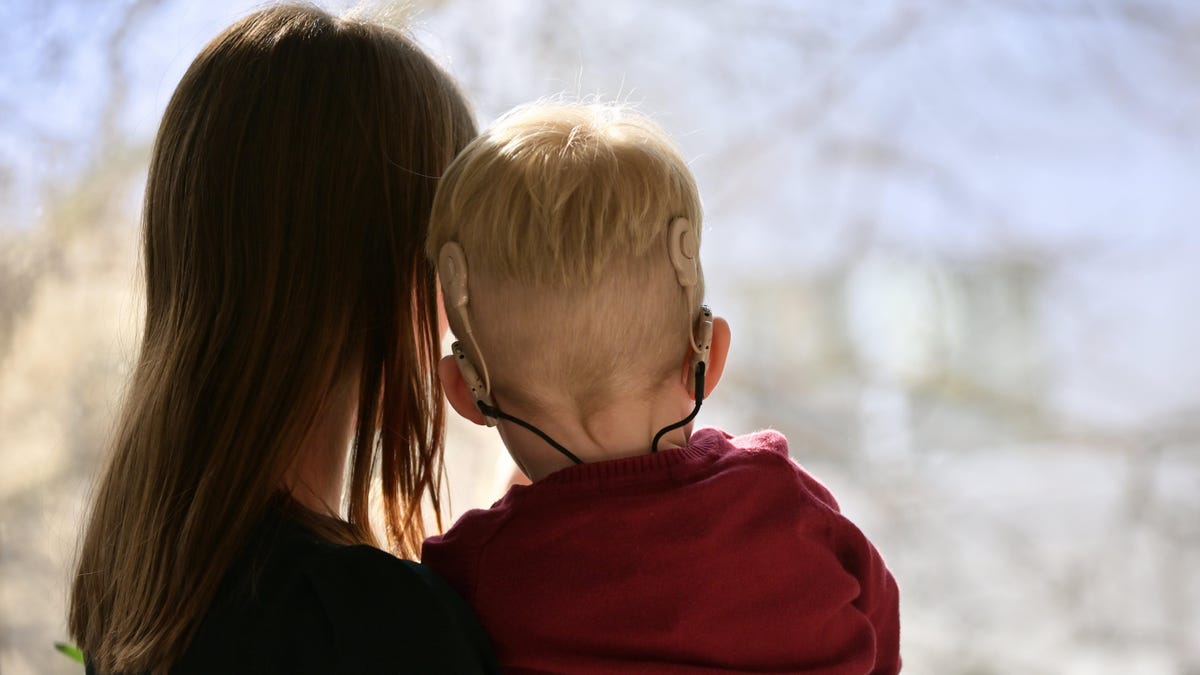These Are Signs of Hearing Loss in Children.

Babies don’t come when you call them, but they’re probably just distracted, right? You keep asking older kids to turn down the volume on the TV, iPad, or Nintendo Switch, but they’re just completely engrossed in their activities, aren’t they? Perhaps, but these are also signs of hearing loss in children.
Hearing loss in children is not uncommon. According to a 2020 review published in the Journal of the American Medical Association , hearing loss affects almost one in five children in the US by age 18. The sooner you notice a child’s hearing loss, the more likely it is that you and their healthcare team need to correct reversible causes or start using resources to improve their ability to communicate.
Why is it important to identify hearing loss in children?
Infants and young children with hearing loss will have trouble communicating and learning language. They are also at risk for other developmental delays. The earlier hearing loss is identified, the more successful interventions such as speech therapy or learning sign language can be.
Along with delayed speech development, hearing loss in children can affect their cognitive function, academic performance, and social development. But even in cases of permanent hearing loss, early use of devices such as hearing aids and cochlear implants can help children develop better language.
Signs of Hearing Loss in Children
All babies born in the US are tested for hearing loss shortly after birth. If your child does not pass the screening test, additional testing is recommended. Babies with hearing loss should start getting early intervention services by 6 months to help them—and you—learn to communicate effectively.
Older children are also checked at regular pediatric visits and in some cases at school. If you notice any of the following signs of hearing loss in your child, you may need to have him or her further tested.
In infants and toddlers:
- No babbling
- Doesn’t respond to parent’s voice by 3 months.
- Does not turn toward sound by 6 months.
- Not afraid of loud sounds
- Doesn’t understand simple phrases by 12 months (e.g., “clap hands” or “wave goodbye”)
- By 12 months, does not imitate sounds and does not say a few words.
- Doesn’t respond when his name is called
- Pays no attention
- By the age of 2, he does not speak about 50 words and does not form a two-word phrase.
For older children:
- Increased volume on the TV, devices, or headphones.
- Difficulties at school
- Difficulty understanding conversations in noisy environments.
- Problems with hearing high pitched sounds.
- Tinnitus
Common Causes of Hearing Loss in Children
Hearing loss can be conductive (sounds do not travel properly through the outer and middle ear), sensorineural (a problem in the inner ear or the nerves and pathways that connect it to the brain), or mixed (a combination of conductive and sensorineural). .
When a baby is born with hearing loss, it is usually caused by a genetic disorder or congenital infection with toxoplasmosis, rubella, cytomegalovirus (CMV), or herpes.
A common cause of conductive hearing loss in young children is fluid behind the eardrum (otitis media with effusion). This type of hearing loss is often temporary, but may still require medication or surgery. Other causes of hearing loss include head trauma, noise trauma, anatomical differences, and certain medications.
When to see a specialist
If you notice the signs of hearing loss listed above, talk to your child’s pediatrician about further testing. If a hearing test shows hearing loss, you may be referred to an otolaryngologist (ear, nose, and throat doctor, or ENT).
Children with chronic ear infections are at risk of temporary hearing loss. An ENT can monitor their hearing and ear health and possibly perform a tympanostomy procedure to insert small tubes into the eardrum for drainage. However, temporary hearing loss due to stagnant fluid may go away on its own.
The American Academy of Otolaryngology suggests asking your child’s doctor the following questions about hearing loss:
- What can I do to make sure my child has the best speech?
- Is my child’s hearing loss (or hearing loss) permanent or temporary?
- How can I prevent my child’s hearing loss?
- How can I monitor my child’s hearing and speech?
- How important is reading to a child?
- Do you recommend taking my child to other specialists or therapists?
People between the ages of 3 and 22 who are diagnosed with hearing loss are eligible for special education services such as speech therapy under the 2004 Education Improvement for Persons with Disabilities Act . Children with hearing loss may also benefit from devices such as hearing aids or cochlear implants.